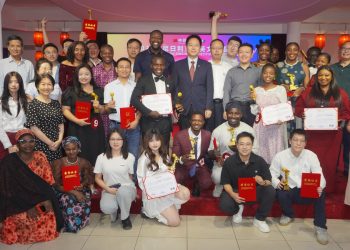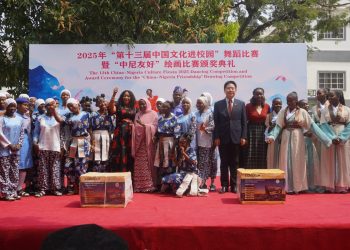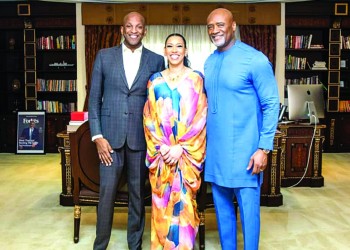In this exclusive interview, Muhammad Sulaiman, National President of the Society of Nigerian Artists and President China Alumni association spoke to our correspondent on his journey through arts and how the Chinese government transformed his career forever.
Mr Sulaima, who is also the President of the Abuja International Open Art Expo and Head of Public Relations, FCTA Arts and Culture Social Development Secretariat spoke on the sidelines of the 2nd International Arts Fair, held at the Cyprian Ekwensi Center for Arts and Culture in Abuja, organized by the National Gallery of Arts and Society of Nigerian Artists.
Q: May we meet you?
Sulaiman: My name is Mohammad Sulaiman, National President, Society of Nigerian Artists and the President of the China Alumni Association.
Q: Can you briefly take us through your career?
Sulaiman: I was born in Nigeria and I have done some studies here in Nigeria and China. I work with the Federal Capital Territory (FCT) Arts and Culture. I am an artist and a painter. I do calligraphy and painting. I have done exhibitions in many countries of the world such as the United States of America, the Caribbean, Europe and parts of Africa. But my breakthrough has been in China, especially in Nanjing and Wuhan.
Q: So what inspired you to go into this profession?
Sulaiman: I will not say it’s a thing of inspiration. Sometimes you stumble into something that becomes a piece of very good news to you. I have looked at myself as a science person involved in science courses. Then art became a fundamental thing that has become so nice to me. I think it’s been a flair right from primary school. Coming into the art has always been like a thing of small obsession. It has been inside me. But then, no regrets concerning everything. I have just been solely into the arts. It’s a thing I hold very dear to my heart. It’s not a thing I am ready to leave.
Q: You mentioned earlier that you are passionate about showcasing your art and craft to the world. What motivated you? Money or passion?
Sulaiman: Basically for me, it’s about being creative. I have been very eager to create things. There was a time I had a Volkswagen Beatle, I had to chop the head off and then that became like I did a supposedly convertible thing. I have been an artist right at heart. Not for necessarily the study or the practice itself. It is a thing that is inborn. If you say for the money, anything you love to do and get paid for doing that, then that is a success. I enjoy being in the arts and I make money from the arts. So it’s a thing of passion and reward also.
Q: You have received lots of awards from the Chinese Embassy here in Nigeria and abroad. How did your relationship with the Chinese embassy start?
Sulaiman: It started with the understanding that there is a cultural section at the Chinese embassy. My presence at the China cultural units there attracted some kind of attention from the Chinese. They attended my exhibition which was the first exhibition I had in Abuja sponsored by Guinness Nigeria in the 90s. That was where the cultural chancellor saw my work and picked interest in it because I had some Chinese calligraphy I displayed that I didn’t know much about. Then the Chancellor was like why don’t you think of studying in China and getting some extension to it. So that was when the study thing in China came up and the Chinese government decided to sponsor my program in China.
Q: So what courses did you study in China?
Sulaiman: I studied painting at the academy of painting and calligraphy in Nanjing. At the Nanjing university of the arts, I was taken to some outlets to understudy some professors. So basically, for me, it’s been a thing of gratitude to the academy and my exhibitions are out there for all to see.
Q: You have always advocated better ties between Nigeria and China. How will describe relations between both nations?
Sulaiman: Two things have been missing. One thing is that both Nigeria and China are multi-cultural societies. China has paid immense attention to its cultural identity. We have a lot to learn from cultural China. Because if you have 1.4 billion people that are not complaining about hunger or joblessness, then you have lots of things to learn from them. The second thing is the attention to population. Why is the government of China not broke? It is because they have gone culturally to understand that cultural tourism is a thing that must be embarked upon. Right now, I am doing a course in Tourism online because you can’t get back to mainland China. You will see that the Chinese have identified what they have which is the population and these people are saying to themselves let the economy revolve around our people. If you go to places like the great wall of China, and the forbidden city, a larger percentage of people that go to these tourist sites are people from China. So if you have a population of 1.4 billion people and you say everybody must give you one yuan, that is a lot of money for the Chinese economy. But the Nigerian government cannot boast of half of its population returning say one naira to the government because they enjoy the service provided. These are things to learn from their system. The whole of China is like a factory. Everything you see around the world is coming from that place. So Nigeria must also turn her country into a factory. You must make sure you are on a productive level. That is what I keep telling everyone. Learn to be a production nation, not a consuming nation.
Q: Has China contributed significantly to the Nigerian economy?
Sulaiman: Yes. because China has trained hundreds of thousands of Nigerians on scholarships. Many Nigerians are studying in China right now courtesy of Chinese scholarships. These students are in the fields of medicine, ICT, engineering, agriculture and so on. What is expected is that these Nigerians will use what they have learnt in China to improve the Nigerian system. Some of us had some training in China and came back to form the China Alumni Association. What the alumni association is saying to Nigerians is that please, make sure that you go back and give to society. We do workshops and masterclasses. We want to teach people how to be solidly productive. We just want to have our hands working. Because if you have that kind of working population, this country will grow so much bigger. So besides the construction companies and the rail revolution, the Chinese have built massive human capacity in Nigeria.
Q: Run us through the social and cultural events between Nigeria and China that you facilitated.
Sulaiman: So many of them because culturally we have done art exchange. So art exchange has been like performances. You understand dress culture, dance culture, food culture and so on. We have exchanged a lot on that through the Chinese embassy. Because of the COVID effect, nothing much has been done. But I can assure you that it is going to resume. But back in the years, say four-five years back we have taken our troops, especially from the FCT cultural centre to China for cultural exchanges. And performances have come from China to Nigeria. They have come to Lagos, Abuja and other places. It’s been good on the social side, the cultural side and the educational side.
Q: Do you think these cultural events have been able to foster harmony in coexistence, harmony in integration and harmony in diversity between Nigeria and China?
Sulaiman: One thing you will find out is that the Chinese are here studying Nigerian languages. They are studying Hausa language at Bayero University, they are studying Yoruba language, they are studying everything. We have also gone to China. A lot of us have been studying Mandarin. You will be so surprised how a Nigerian will speak Mandarin fluently to you. But that is not even the whole area. We have over 50 years of diplomatic relations between Nigeria and China. This relationship has been nurtured through cultural competitions and exchanges. We also have cultural centres in Beijing and Abuja.
There have been a lot of cultural exchanges between Nigeria and China. We have taken a lot from Nigeria and have taken it to China. We have been to Shanghai, Beijing and many other Chinese cities. It is the same thing as when the Chinese troupes come to Nigeria. They have been to Lagos, Abuja. The Chinese Ambassador to Nigeria, Cui Jianchhun has made sure that Nigeria is put in the spotlight. Lee Chuda, Cultural Chancellor is always at his best. Every event you invite him to, he attends. He has so mixed with Nigerians that will call him Second Nigerian. What that has been able to do is that Nigerians are beginning to understand that Nigeria and China have many things in common culturally. We both have diverse dress cultures, languages, food, cuisines, culinary and so on. Nigerians have been able to realise that there is not so much difference between us aside from the colour of our skin that is trying to put us a par.
Q: You were very instrumental in the formation of the China Alumni Association. What motivated you?
Sulaiman: It’s very simple. We went to China for training and came back. Why don’t we get ourselves together and apply what we’ve learned in building the nation?
Q: So what is the success story of the alumni so far?
Sulaiman: The success story is that we have been able to reach the hinterlands to identify the doctors, engineers, artists and others that have studied in China to help build this country. The whole idea is to give a reflection of what you have been seeing in China. We took it down to secondary schools. So we building a society of people that understands harmony in symphony like the Ambassador will say. China is also investing its own money into this. When there was COVID, we were able to contribute from here and send to Nigerian students in China for them to understand that we are with them from here. So it’s like a community of people that must build this country. If we don’t build this country, nobody will do so for us. That is essentially why we are identifying and calling them. We try to get across to anyone who has gone to China for training.
Q: Describe your experience in China
Sulaiman: I was in China not to look at the tall buildings but to study the people and understand what makes them thick. The thing that has made them thick is that there is a work mentality. Over 1.4 billion people are not lazying or spending the whole day telling stories to themselves. Every Chinese that you find inside China every day strives to make sure he puts his hand into doing something. Things are moving. But you should be looking at the things they are producing than the people themselves that are talking. But if you want to interact with them, you must borrow some parts of what makes them who they are. What I picked from the streets of China are the people themselves and essentially what they do and how dey do it.
Q: What can you say about the Chinese people?
Sulaiman: The Chinese people have competition around the world. That is why they strive very hard. China is at the centre of everything. It has received a lot of backlash from everywhere. But those that understand from a positive part know that this is a production nation. This is like the warehouse of the world, the engine room of the world where things come out from. This is the nation we should strive hard to be. I look at the ordinary Chinese person just like I look at most Nigerians. Hardworking, striving to get to the top. But it’s a very big battle. If you see them, you see the Nigerian. That’s who they are.
Q: Where do you we the relationship between Nigeria and China in the next 50 years?
Sulaiman: In the next 50 years, Nigeria would have overtaken China. But to overtake China is not going to be a day’s job. The Nigerian learns everything too fast. Anytime we stand up to do something, we do just too well. I hope Nigeria will keep up the steam like this and you will see a lot of wonderful things happening from us. Nigeria is loaded with abundant resources and 50 years from now with good leadership and better production, we will rule the world.
[End]













































